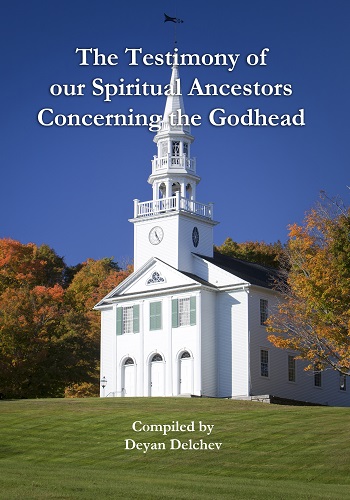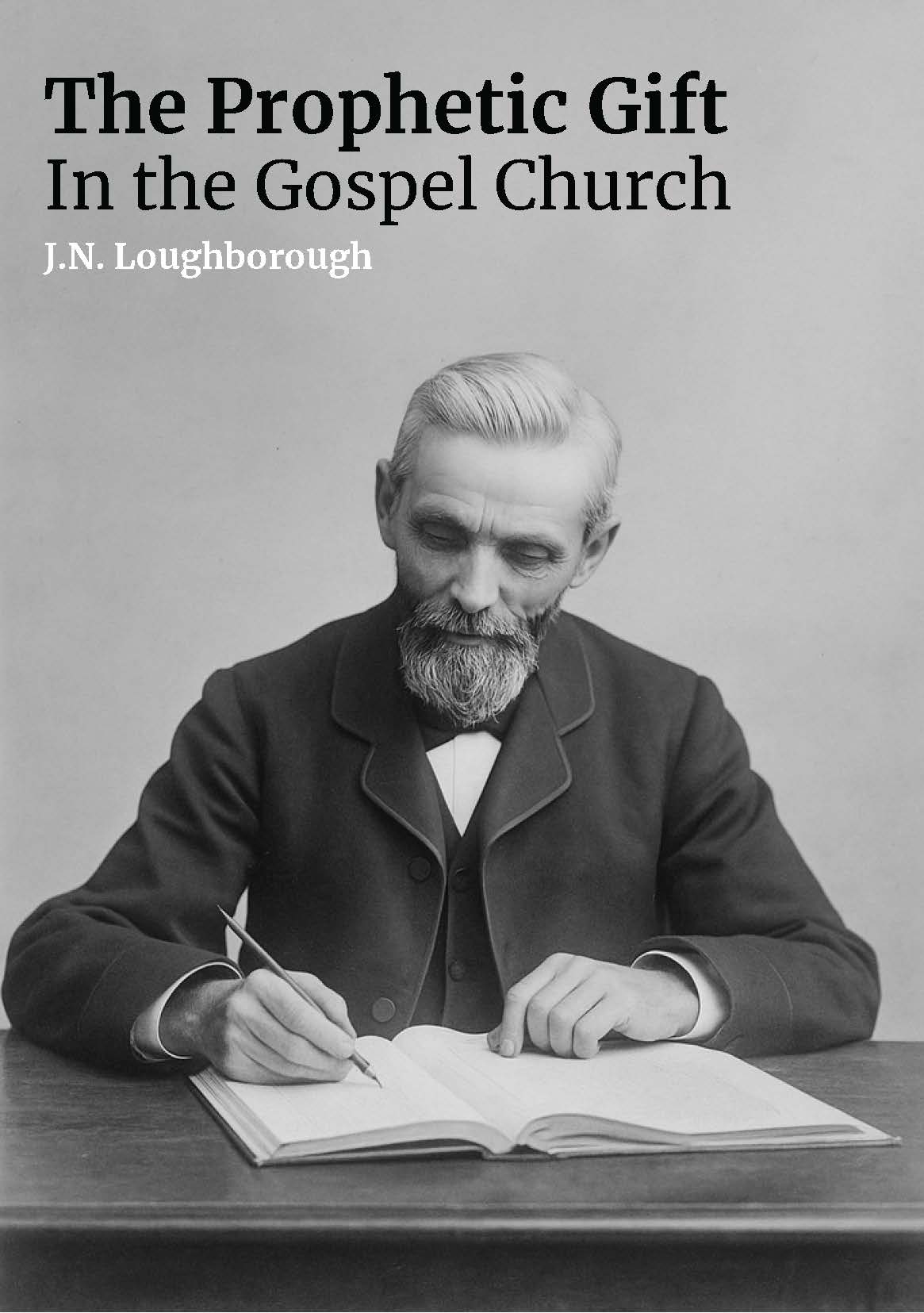The Love of God - Toward Fallen Man
"Behold, what manner of love the Father hath bestowed upon us, that we should be called the sons of God; therefore the world knoweth us not, because it knew him not."
The love of God toward fallen man is incomprehensible. The apostle cannot find words to describe it, but he calls upon the world to "behold what manner of love the Father hath bestowed upon us, that we should be called the sons of God." The love of the infinite God for his rebellious children is the most wonderful thing that the universe knows, and it will be constantly unfolding throughout the ceaseless ages of eternity.
I feel an intense interest that all should comprehend, as far as possible, the love of God. We cannot afford to draw away our attention from this subject, for in it is contained the mystery of God,--the plan of salvation. We may put to the stretch every power of our mind, and yet we shall not be fully able to comprehend the heights and depths of the love of God; for the human mind is not capable of understanding its full significance. It is our privilege, however, to obtain clearer and more distinct views of the plan of salvation. We should not be content with a superficial knowledge of this wonderful plan, but we should seek to behold it in all its greatness, that as far as possible we may understand the love of God.
It is our privilege to grow in grace and in the knowledge of the truth. We should become better and better acquainted with the things of God. It is Satan's design to engage the attention of men with matters of worldly interest, so that they shall have no desire to contemplate the wonders of the love of God.
When our first parents transgressed the holy law of God, the Lord promised that the seed of the woman should bruise the serpent's head; the serpent was to bruise the heel of the seed of the woman. But he was to have no power to touch the head. Humanity was lost, and Christ appeared as the world's Redeemer, the seed to whom the promises were made. He died to redeem mankind. Those who believed in him excited the wrath of the evil one, for Satan claimed man as his property. Satan persecuted the people of God. He tortured them, and put them to death; but in dying they became conquerors. They revealed in this steadfast faith a mightier one than Satan. Satan could torture and kill the body, but he could not touch the life that was hid with Christ in God. He could incarcerate in prison walls, but he could not bind the spirit. Living faith connected the people of God with Him who only hath immortality. They could look beyond the gloom to the glory that was to be revealed at the appearing of Jesus. Paul suffered much. He was persecuted from city to city, in perils oft, in prison, in scourging, in bonds, in fastings, in wearinesses and painful watchings, but he looked beyond the sufferings of the present time to glory beyond, and said: "I reckon that the sufferings of this present time are not worthy to be compared with the glory which shall be revealed in us." This is what God would have his people do. He would have us reckon and consider the rich reward of the eternal world, that we may appreciate the privileges that are brought within our reach through the plan of salvation.
Christ came to our world to become our sacrifice. He came to discover to our eyes the gems of truth, to place them in a new setting,--the frame-work of truth. He brought out of the treasure-house of God things new and old, that we might be able to trace down the links in the great plan of salvation. Through the sacrificial offerings of the Jewish dispensation, we are pointed forward to Christ, the Lamb of God which taketh away the sin of the world. When Christ came, it was to engage in the conflict with the enemy of God and man, on this earth, in the sight of the universe of heaven. But why was it necessary to wage the warfare in the sight of other worlds?--It was because Satan had been an exalted angel, and when he fell, he induced many angels to join him in his revolt against God's government. He worked in the minds of the angels as he works in the minds of men today. He made a pretension of loyalty to God, and yet he argued that angels should not be under law. He inculcated his ideas, his rebellion and enmity, and hatred of God's law originated in the minds of the angels in heaven through his influence. He caused the fall of man through the same temptations with which he had caused the fall of angels; and in the world where he proposed to work out his principles of rebellion, the battle had to be fought, that all might behold the real nature and results of disobedience to God's great moral standard. He represented God in a false light, clothing him with his own attributes. Christ came to represent the Father in his true character. He showed that he was not an arbitrary judge, ready to bring judgments upon men, and delighting in condemning and punishing them for their evil deeds. The Lord proclaimed his character to Moses in the mount. "And the Lord descended in the cloud, and stood with him there, and proclaimed the name of the Lord. And the Lord passed by before him, and proclaimed, The Lord, The Lord God, merciful and gracious, long-suffering, and abundant in goodness and truth, keeping mercy for thousands, forgiving iniquity and transgression and sin, and that will by no means clear the guilty."
This was the description that God gave of his own character. Jesus came to represent the goodness and mercy and love of the Father, and Satan was filled with enmity toward the Son of God, and strove from his very birth to destroy him. He worked through wicked Herod to accomplish his design, but the Lord preserved the life of the young child Jesus, and thwarted the design of the evil one. Repeatedly the life of Christ was in peril. Many times even after the people had listened to his gracious words, and had seen the manifestation of his power in healing the sick and blessing those around him, they were ready to destroy him. He hated sin with a perfect hatred. It was the pure, spotless life of Jesus that stirred up the hatred of Satan and a profligate nation; for Christ did no sin, neither was guile found in his mouth. The Jewish nation was filled with doubt and prejudice, and this led them to hate the Son of God. Because of their unbelief, they were on the enemy's side, under the control of the evil one.
Jesus was hunted from place to place during his ministry. Priests and rulers were on his track. They misrepresented his mission and labor. He came unto his own and his own received him not. Angels watched the conflict at every step. They saw the spirit and work of the enemy. They looked with amazement upon the devices of Satan against the divine Son of God. They saw that he who had only been second to Jesus in power and glory had fallen so low that he could influence men to hunt the steps of Christ from city to city. When Christ sought the garden of Gethsemane, the enemy pressed darkness upon his soul. Even his disciples did not watch with him through that hour of trial. They heard the agony of prayer that came from his pale and quivering lips, but they soon allowed sleep to overcome them, and left their suffering Master to wrestle with the powers of darkness alone.
It was in the garden of Gethsemane that the mysterious cup trembled in his hand. Would he drink of the bitter portion and save a lost world? or would he forbear and let it perish? The destiny of the fallen race trembled in the balance. If he drank of the cup of suffering, he must open his breast to the griefs and woes and sins of humanity. He prayed, "O my Father, if it be possible, let this cup pass from me; nevertheless not as I will, but as thou wilt." He had said to his disciples, "My soul is exceeding sorrowful, even unto death." His suffering almost extinguished his life. The drops of blood beaded his forehead, and dewed the sod of Gethsemane. "His visage was so marred more than any man, and his form more than the sons of men." When he fainted as in death, an angel came to the divine Sufferer, and offered him the cup of consolation to strengthen him for the conflict.
The Saviour of the world arose, and for the third time sought his disciples, and found them sleeping. He looked sorrowfully upon them, and his words aroused them: "Sleep on now, and take your rest; behold, the hour is at hand, and the Son of man is betrayed into the hands of sinners."
Even while these words were upon his lips, the footsteps of the mob that was in search of him were heard. Judas took the lead, and was closely followed by the murderous throng. Jesus turned to his disciples, as his enemies approached, and said, "Rise, let us be going; behold, he is at hand that doth betray me." The countenance of the Saviour wore an expression of calm dignity; no traces of his recent agony were visible as he stepped forth to meet his betrayer.
He suffered himself to be taken by the murderous throng, and was dragged from one tribunal to another. Although Isaiah had written, "Unto us a child is born, unto us a son is given; and the government shall be upon his shoulder; and his name shall be called Wonderful, Counselor, The mighty God, The everlasting Father, The Prince of peace," yet he was now mocked, derided, spit upon, scourged, and maltreated. Was he innocent?--Yes; but innocence does not save men from persecution when the evil one controls the minds of their tormentors. Jesus is our pattern. He has given us an example that we should follow in his steps. Many will have to pass through scenes similar to those through which Jesus passed. After he was judged, he was brought forth to the people, and Pilate declared, "I find no fault in this man," but the people cried, "Crucify him, crucify him." "When Pilate saw that he could prevail nothing, but that rather a tumult was made, he took water, and washed his hands before the multitude, saying, I am innocent of the blood of this just person; see ye to it. Then answered all the people, and said, His blood be on us, and on our children."
Christ was the Son of God, equal with the Father; and yet he was abused, ridiculed, scourged, and crucified. There are many who have thought that the Father had no part in the sufferings of the Son; but this is a mistake. The Father suffered with the Son. When the Son of God hung upon Calvary, the darkness gathered like the pall of death about the cross. All nature sympathized with its dying Author. There were thunderings and lightnings, and a mighty earthquake, but the hearts of men were so hardened that they could quarrel at the foot of the cross upon which hung the world's Redeemer, about the dividing of his vesture. Their hearts seemed to be wholly under the control of the powers of darkness. Angels looked upon the scene with sorrow and amazement. As man's substitute and surety, the iniquity of men was laid upon Christ; he was counted a transgressor that he might redeem them from the curse of the law. The guilt of every descendant of Adam was pressing upon his heart; and the wrath of God, and the terrible manifestation of his displeasure because of iniquity, filled the soul of his Son with consternation. The withdrawal of the divine countenance from the Saviour, in this hour of supreme anguish, pierced his heart with a sorrow that can never be fully understood by man. Sin, so hateful to his sight, was heaped upon him till he groaned beneath its weight. The despairing agony of the Son of God was so much greater than his physical pain, that the latter was hardly felt by him. The hosts of Heaven veiled their faces from the fearful sight. They heard his despairing cry, "My God, my God, why hast thou forsaken me?" they saw the divine Sufferer die beneath the sins of the world.
Jesus was laid in the tomb. He went into the darkness of the grave, and tasted death for every man. But he did not long remain under the power of the enemy. A mighty angel came from heaven and rolled back the stone from the sepulcher, and for fear of him the keepers did fear and quake, and became as dead men. Christ came forth from the tomb a triumphant conqueror, and led forth from their graves a multitude of captives.
The Roman guard hastened to tell the rulers what had occurred, and they were bribed to testify that his disciples had stolen his body away by night. When the women who had followed Jesus came to the sepulcher, the angel said unto them: "Fear not ye; for I know that ye seek Jesus, which was crucified. He is not here; for he is risen, as he said. Come, see the place where the Lord lay. And go quickly, and tell his disciples that he is risen from the dead; and behold, he goeth before you into Galilee; there shall ye see him; lo, I have told you."
We have a risen Saviour; he has ascended up on high, and ever liveth to make intercession for us. Through him those who believe in him shall be crowned with glory, honor, and immortality; for "the Lord himself shall descend from heaven with a shout, with the voice of the archangel, and with the trump of God; and the dead in Christ shall rise first; then we which are alive and remain shall be caught up together with them in the clouds, to meet the Lord in the air; and so shall we ever be with the Lord.
Signs of the Times November 18,25 1889
[From SERMON AT CHICAGO, ILL., APRIL 9, 1889.]





